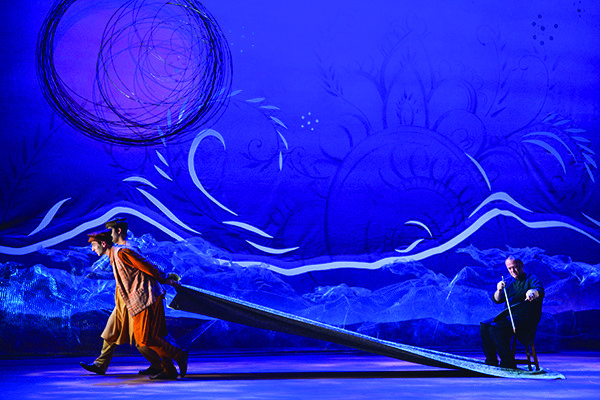By Charles Brousse
Weeks before Berkeley Repertory Theatre (BRT) opened its production of Lisa Loomer’s Roe, a play directed by the Oregon Shakespeare Festival’s Bill Rauch about the landmark 1973 Supreme Court case that established a woman’s constitutional right to a legal abortion, I anticipated that it would be a slam dunk for the pro-choice advocates. After all, what could be a more supportive environment than Berkeley, home of the free speech movement and a bastion of progressive liberalism? The downside, if any, would be that Loomer would be preaching to the choir.
Turns out I was wrong. Yes, salient arguments for choice made by characters on stage were greeted with applause, and most of opening night’s full house rose to express their enthusiasm at the end—but it wasn’t the full-throated endorsement I expected. The strangest part was that—without knowing where it came from—I also sensed a troubling undercurrent.
In an early January press release, BRT Artistic Director Tony Taccone is quoted as saying, “As the play unfolds, people may be forced to examine their beliefs about abortion, and it should be interesting to see what happens.” Interesting? How?
In a program note that acknowledges Loomer’s challenge of coming up with an “objective account” of events before and after the Roe decision, Taccone writes that the focus on the divergent accounts by her leading characters—lawyer Sarah Weddington and her client, Norma McCorvey (aka Jane Roe)—allows her to move beyond “the conventional wisdom of seeing two different sides of the argument” and instead concentrate on the human impacts of both positions. Loomer herself corroborates this goal in an interview and concludes, “Don’t we have to hear from both sides? … If we can open our minds enough to even consider a position that is different from the one we brought into the theatre—that is the beginning of compassion.”
The problem with that is that it poses a dangerous moral equivalency, made even more disquieting by the way the two sides are depicted. Weddington (played perhaps a little more stiffly than the role requires by Sarah Jane Agnew) comes across as an ambitious legalist who is more interested in being the youngest female attorney to ever win a Supreme Court case than in the personal welfare of her client. Supporters in the National Association for the Repeal of Abortion Laws (NARAL) and the Betty Friedan wing of the feminist movement are similarly more directed toward general legal reform than individual needs. For them, Norma McCorvey, who told her story of having to bear a child after being raped, was only a convenient vehicle for challenging a Texas anti-abortion law.
Gradually, McCorvey (Sara Bruner, in a bravura performance), becomes disenchanted and ultimately hostile. Yearning to be recognized for who she is, rather than as “Jane Roe,” she eventually betrays her longtime partner and anchor, Connie Gonzales (sympathetically portrayed by Catherine Castellanos) and—attracted by a kindly preacher (Jim Abele) and a lovable young child (Zoe Bishop)—finds warm acceptance and Christian “rebirth” in a local Texas evangelical congregation. She also authors two books, in one of which she claims that all of her testimony in Roe v. Wade that made its way through the court system was based on lies.
So, there you have it. Since Weddington published a very different account of the events, we have dueling perspectives dramatized by Loomer. One stresses the decision, and its beneficial impact on women in general; the other centers on the need for compassionate responses to an actual person’s needs. Small wonder that there was unease beneath the liberals’ cheers.
NOW PLAYING: Roe runs through April 2 at Berkeley Repertory Theatre’s Roda Theatre, 2015 Addison St., Berkeley; 510/647-2949; berkeleyrep.org.











